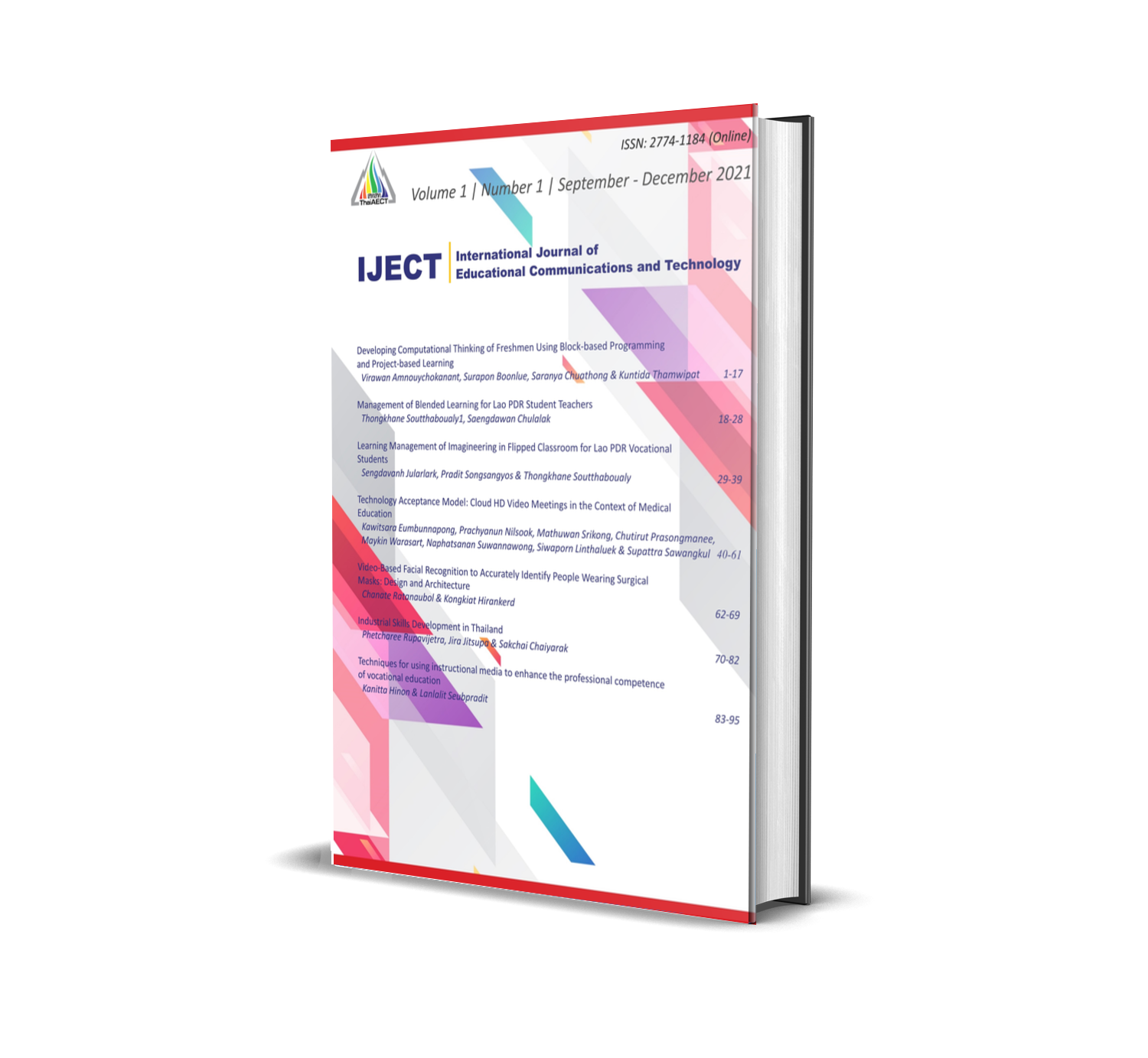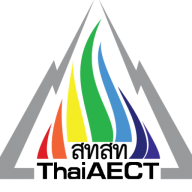Learning Management of Imagineering in Flipped Classroom for Lao PDR Vocational Students
Keywords:
Learning Management, Imagineering, Flipped Classroom, Lao PDR Vocational StudentsAbstract
Flipped learning is another form of learning that can apply in vocational education. There are cases where students have to go out for internships with entrepreneurs, which refers to practising vocational education courses. The second-year students with professional knowledge deserve to be sent out for internships with the public and private sectors. Whereas students go for internships, they learn how to work in entrepreneurs who meet vocational education. Its focus is on learning real work and practice to create a carrier in real life the application of the Flipped classroom in the courses of vocational education. While the students take the internship, a teacher will provide students with an entrepreneur's problems. Students study how to use or create innovation or a new working direction. After students return from internships, they will have to report innovations, pieces of work, or even different work trends that have been studied in the classroom. A teacher will evaluate. It will give students enthusiasm. Besides, the purpose of the internship is another credit 1 of the study, where students will see the importance of internship and have willing to work.
References
Chatwattana, P. (2018). The synthesis of activity model using project-based learning of imagineering to enchance creative construction of multimedia skills and cooperative skills. Silpakorn University Journal, 38(1), 161–183.
Csizmadia, A., Standl, B., & Waite, J. (2019). Integrating the Constructionist Learning Theory with Computational Thinking Classroom Activities. Informatics in Education, 18(1), 41–67.
Fungfuang, P.-O., Wattanatron, A., & Panichpalinchai, T. (2010). Model of Learning on Local Curriculum Development with Knowledge Management Networking. Journal of Education Naresuan University, 12(3), 113–132. Retrieved from https://www.tci-thaijo.org/index.php/edujournal_nu/article/view/9302
http://www.adb.org/Documents/CPS/?id=LAO-2017.(2017).cps-lao-2017-2021-lo.pdf, http://www.adb.org/Documents/CPS/?id=LAO-2017.
Kupongsak, N. (2017). Learning Achievement on Thai Language for Creativity and Learners’ Satisfaction Towards the Flipped Classroom Method. Journal of Graduate Studies Valaya Alongkron Rajabhat University, 11(1), 55–67.
Lunce, L. M., & Student, D. (2006). Simulations: Bringing the benefits of situated learning to the traditional classroom. Journal of Applied Educational Technology, 3(1), 37–45.
Meesuwan, W. (2018). Effects of Using Social Network with Flipped Classroom to Support Communication Skills. Journal of Education Naresuan University, 20(3), 162–172.
Ministry of Education and Sports of Lao PDR. (2015). Minister’s Agreement National Vocational Education Curriculum Standard No. 7247 (p. 13). p. 13.
Mustafa, Pinton Setya. 2021. “Implementation of Behaviorism Theory-Based Training Learning Model in Physical Education in Class Vii Junior High School Football Game Materials.” COMPETITOR: Jurnal Pendidikan Kepelatihan Olahraga 13(1): 39.
Neiterman, E., & Zaza, C. (2019). A Mixed Blessing? Students’ and Instructors’ Perspectives about Off-Task Technology Use in the Academic Classroom. The Canadian Journal for the Scholarship of Teaching and Learning, 10(1), 1–16. Retrieved from https://doi.org/10.5206/cjsotl-rcacea.2019.1.8002
Phetthany, P. (2015). Strategic Plan Performance for Development of Technical Vocational Education and Training of the Vocational Educational Institutes in the Lao PDR.
Phromfaiy, A. (2017). Development of Kinect Guided Senior Citizen Following Robot by Fuzzy Control. The Journal of King Mongkut’s University of Technology North Bangkok, 27(2), 329–337. https://doi.org/10.14416/j.kmutnb.2017.03.015
Plisorn, W. (2018). the development of intelligent cloud learning system to develop digital literacy and collaborative learning skill used the research design of research and development.
Pruekpramool, C., Phonphok, N., Kanyaprasit, K., Sangpradit, T., & Dahsah, C. (2016). InService Science Teachers’ Views Toward Scientific Imagination for Science Learning in the Classroom. Journal of Education Naresuan University, 18(2), 81–92.
Sakulprasertsri, K. (2017). Flipped Learning Approach: Engaging 21 st Century Learners in English Classrooms. LEARN Journal, 10(2), 132–143.
Sanglub, A., Nilsook, P., & Wannapiroon, P. (2019). Imagineering on Augmented Reality and Digital Twin for Digital Competence. International Journal of Information and Education Technology, 9(3), 213–217. https://doi.org/10.18178/ijiet.2019.9.3.1201
Sarnok, K., Wannapiroo, P., & Nilsook, P. (2019). Digital Learning Ecosystem by Using Digital Storytelling for Teacher Profession Students. International Journal of Information and Education Technology, 9(1), 21–26. https://doi.org/10.18178/ijiet.2019.9.1.1167
Suwannaphisit, S., Anusitviwat, C., Hongnaparak, T., & Bvonpanttarananon, J. (2021). Expectations on online orthopedic course using constructivism theory: A cross-sectional study among medical students. Annals of Medicine and Surgery, 67(June), 102493. https://doi.org/10.1016/j.amsu.2021.102493
Teanprapakun, P. (2021). Development of Higher-Order Thinking Skills through the Flipped Classroom Teaching in Philosophy of Education Course. Journal of Humanities and Social Sciences University, 9(2), 72–86.
Tongpitak, N., Piromjitpong, S., & Asawapoom, S. (1906). The Development of Flexible Learning Model for *Rajabhat Undergraduate Students in Lower Northeastern Region. Veridian E-Journal, Silpakorn University, 3(9), 527–542.
Wannapiroon, P., Nilsook, P., Jitsupa, J., & Chaiyarak, S. (2021). World Journal on Educational Technology: Current Issues Technology acceptance of online instruction for vocational instructors in new normal education. 13(4), 635–650.
Downloads
Published
How to Cite
Issue
Section
License
Copyright (c) 2021 International Journal of Educational Communications and Technology

This work is licensed under a Creative Commons Attribution-NonCommercial 4.0 International License.







